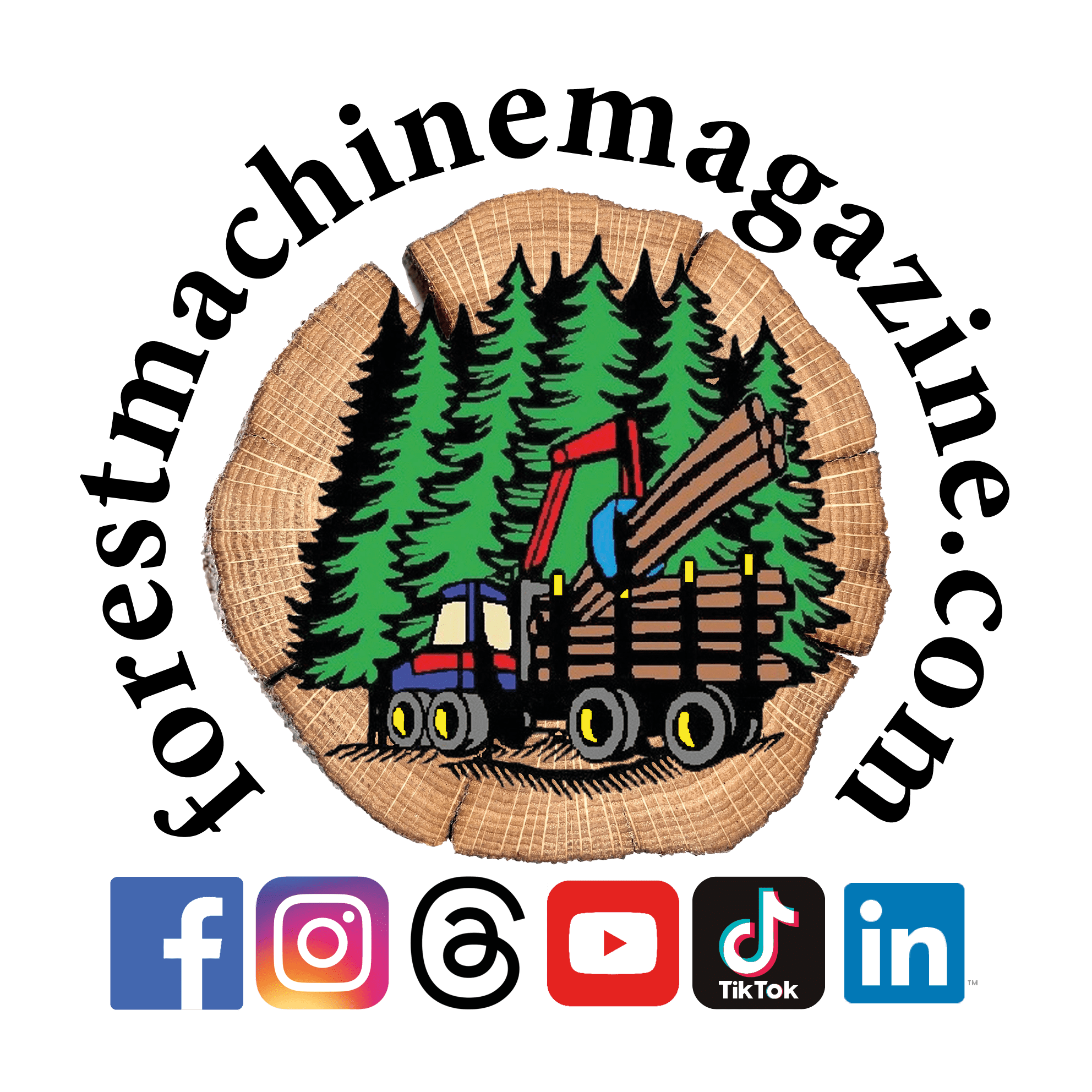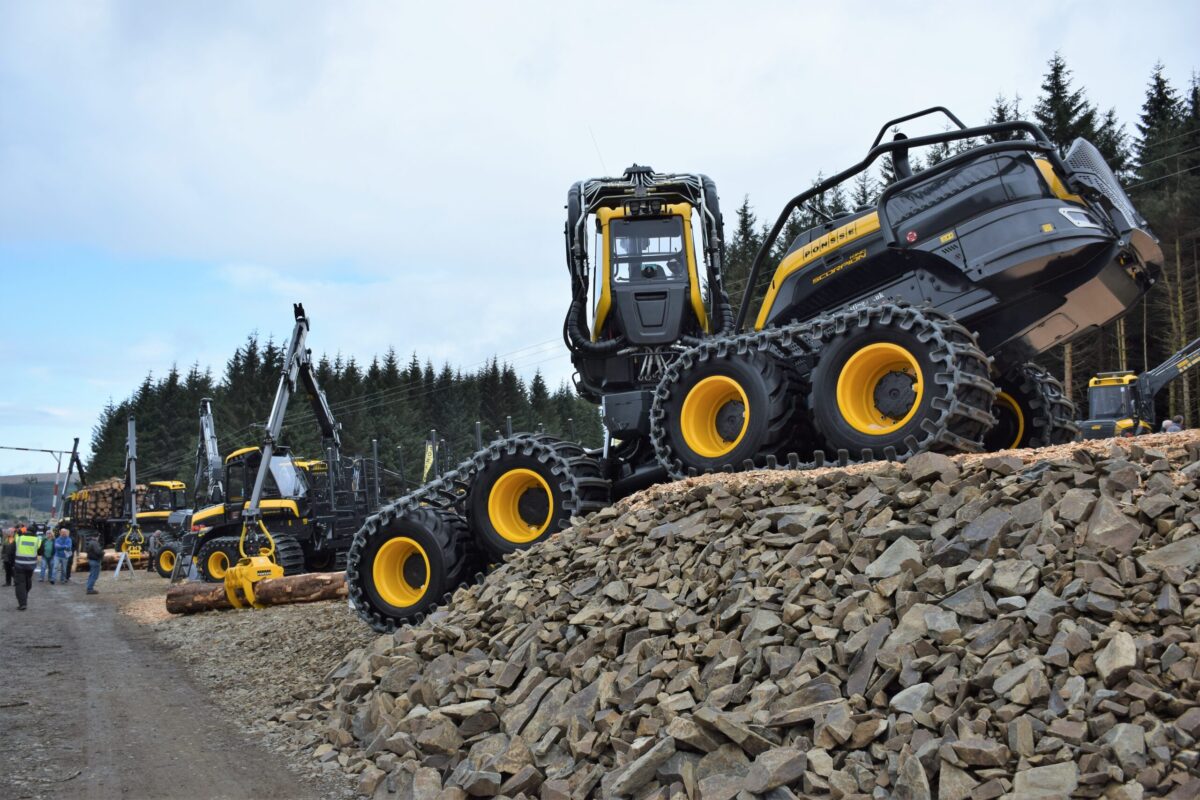With an aging workforce and very few young people coming into the industry, FMM asked a broad spectrum of people throughout the industry for suggestions on how they are addressing this problem and what ideas they have for going forward.
Forestry is a £2.5 billion industry which employs around 60,000 people and contributes a vast amount of coffers to the UK treasury.
I don’t know how you folks feel but I think there is something very wrong with the industry when it comes to recruitment and training. Very few people today are considering forestry as a career and unless something is done soon we are heading for a meltdown. “Young people are increasingly looking for a better life balance, better job security, spending more time with their families and taking holidays” said Nick Marshall of Treeline Scotland. “I feel the forest industry needs to try harder to keep up with the other benefits which most industries and employers offer, otherwise how can we expect to tempt people? While there appears to have been an attempt to improve working conditions recently with the controversial implementation of provision of welfare facilities this seems to be massively missing the point and I have yet to speak to a contractor who believes that this has provided an improvement.
In the last couple of years we have lost two good, young guys, not just from our employ but from the forest industry. Their wives or partners both had good, well-paying jobs in other industries and even though we had them employed with full time work, paid holidays, pensions, etc. we could not then compete with their partners salaries and so they have had to take over childcare. These were enthusiastic, hard-working and passionate individuals but it did not make financial sense for them to continue working within forestry.
READ MORE: ABA International Forestry Training Courses
If we want to attract and retain the calibre of people that will be required to keep the forest industry great in the future I believe we need to not only pay people well but give them greater job security and better benefits, with some long term progression prospects. I believe that thriving, profitable, modern contracting businesses are best placed to offer this but they must be supported and allowed to flourish.
We have an ageing workforce (with an already high average age). However, it is not just age that is a problem; I have seen contractors closing up shop simply due to the difficulties of operating a contracting business within this industry. This is an industry which is getting increasingly technical, where we are expecting people to operate and maintain incredibly complex and expensive machinery in harsh and isolated environments, all while margins are being put under increasing pressure. 2018 in particular saw a spike in timber values with standing sales reaching record levels. Instead of this boom leading to increased revenues throughout the supply chain it appeared that contractors and hauliers were squeezed harder than ever in order to maximise the price offered for the standing sale. While Individual operators can earn well this is often achieved by working long hours and staying away from home. I think it is getting harder to run a competitive and successful contracting business which is what we need to employ and bring on the future workforce”.
On every forestry page and group on social media you will find post’s “looking for operators/workers” and instead of new people coming on board you have existing operators moving from job to job for better conditions or money. Basically as one seat is filled it leaves another one empty and when you throw into the mix that most operators and drivers are in their 50’s, 60’s and even 70’s with many heading for retirement we will soon be in deep trouble. With an increasing demand for timber products this is an issue that is not going away. With Brexit looming this will hinder the arrival of foreign operators who have helped in glossing over our own skills shortage. I have worked with quite a few Latvian operators and found them to be genuine people who are hard workers with a high level of skill.
People around my age will remember how difficult things used to be. Most of us were chainsaw operators felling trees for skidder or skyline extraction; this was a hard, physical occupation which involved working in all weather conditions (we were paid by production: no work = no wages) with one of the highest accident rates. In the 1970’s safety equipment was rare, very expensive, uncomfortable and heavy to wear, especially on hot summer days. Wages were poor and it was difficult to get the earned money as most companies paid on a ‘load away basis’; this meant that if timber was slow to move to the sawmill, we all suffered from a money drought. Nonetheless, very few people left the industry as it was more of a way of life rather than a job and, to this day, most of my lifelong friends are still or used to be involved in the industry, even on nights out (pre Covid-19 of course) the conversation invariably ends up forestry related. Forget the sex, drugs and rock and roll, we are more your chainsaws, trees and log and load kind of people. We are far more resilient than other industries with an amazing never give up attitude. Forestry is one of the few industries where there is still great camaraderie to be found, of course there will be fall outs from time to time but these are normally settled one way or another and then we are all able to move on and continue working together.
In the 1970’s, the Forestry Commission’s training methods were highly effective. Time was spent on improving knowledge of chainsaws and felling aids with particular emphasis on safety and maintenance. It was drummed in to us that getting the correct technique was vital and that speed would come with experience. I spent two weeks on a chainsaw course, then felling for six months before given another course on large trees. Over the next three years I attended courses on harvesting windblown timber, bench felling and shortwood felling. At the end of the three years I had achieved sufficient skills to gain a craftsman certificate which subsequently ended my apprenticeship and qualified me for full pay.
Rab Easton
During the 1990’s the industry became better organised as mechanised harvesting took over from manual squads. Good machine operators who were high volume produces experienced an upturn in demand and were rewarded with excellent salaries and were operating reliable, efficient equipment.
Since the turn of the century, fewer young operators have joined the industry. Like every industry, forestry has had to move forward with the introduction of licensing (which involved demonstrating a good level of competence) and first aid certification. Up to this point, there was a waiting list for people wanting to make the leap from chainsaw or skidder to operating a harvester or forwarder and training usually involved operating an older machine on weekends to gain valuable experience. The introduction of the NPTC certificates meant that a qualified machine operator had to be on site with a trainee that held a provisional licence. This meant the days of jumping on a machine at lunch times and weekends were now gone.
The Barony College were one of the few Colleges with facilities to run a machine course. At that time they ran a 12 week course using experienced operators as instructors. Three days were spent out on machines, one day in the workshop on repairs and servicing and a half day in the classroom on wood identification and mensuration. I had six students and the possibility of 4 courses per year as well as weekend courses. The only problem with the course were the hours – 9.15am – 3pm with one hour for lunch. This wasn’t a real reflection of working hours. The courses ran for a few years before being withdrawn due to lack of funding.
-
That’s a remarkable amount of work hours for a single machine, the Norcar 600 owned by Erkki Rinne is taken well care of, it even has the original Diesel engine.
-
Kieran Anders is a forestry contractor working in the lake district. His work involves hand cutting and extracting timber using a skidder and tractor-trailer forwarder.
-
It is not possible to eliminate chain shot, but there are simple steps that can be taken to reduce the risk.
-
Arwel takes great pride in the fact that the mill has no waste whatsoever, “the peelings are used for children’s playgrounds, gardens and for farm animals in barns in the winter and the sawdust has multiple uses in gardens and farms as well.
-
Timber hauliers need to encourage young blood in, and also look after the hauliers we have, we need make the sector a safe and positive place to work.
Find Us On
Nick Marshall
Nick has been working in forestry full time for the last 10 years having been involved in forestry from a young age, starting with a months tree planting at the age of 12. He got chainsaw and climbing tickets before going to study engineering at uni and working abroad for a few years. He later returned to join his father in the family forestry business, gaining harvesting and forwarding tickets and buying machines to start a harvesting enterprise. The business continues to provide both management and contracting services as well as firewood and timber supply and machinery sales.
Related Posts
Simulation
Forestry is a hands on occupation which has to be learned in realistic conditions, simulators are an excellent tool for initial training, honing skills and making the transition from forwarder to harvester but the only place you will learn your trade properly is in the real environment. Using the correct trainers is equally as important, using good experienced operators is the way forward for this to work. We have a lot of good operators in their twilight years that would be only too happy to pass on their experiences and knowledge to eager apprentices.
“Training simulators for advanced machine training is not a new thing” said Per Annemalm, Managing Direct, Komatsu Forest Ltd. “Simulators have been used in the aviation industry since WWII. Komatsu Forest was the first forest machine manufacturer to develop a training simulator for rubber wheeled harvesters, in the 90’s. The manufacturers have delivered hundreds of simulators through the years to schools and forestry business around the globe.
The idea behind a simulator is that it should mirror real-life operation as far as possible. The modern simulators perform work the same way a machine does in the forest. They simulate the behaviour of the control system. The design of the machines comes from the drawing board of the real ones and the same working methods can be applied as for a real machine. The latest versions of simulators even have plug-ins for training scenarios. This means the student will be graded by the simulator, based on how efficiently they use the equipment and the working method. The student can try the same logging site again and again, giving the opportunity to analyse and compare different performances. There are enhancement options such as Motion platforms, Virtual Reality googles, 3 screens, and various hand controls” Per continues.
“The simulator tool has always had to overcome two preconceptions in forestry – “They are expensive”, and “they are not like real machines”. If you can acknowledge that they can teach a student how to operate a machine, the first preconception can easily be argued. The price for a full-blown simulator package is somewhere between £35k and £40k. A real harvester will be 10 times that price. A harvester will of course produce an income, but only in relation to the skill of the student; from the beginning hardly a penny. The real harvester will also cost diesel, lubricants, and service visits. And the risk for breaking expensive machine parts due to inexperience will be relatively high. The simulator only requires a 230V wall socket. There is no service schedule and if you wreck the simulated machine, you just restart the program. I have used it many times myself and ripped off quite a few oil hoses from the crane to the head. It repairs itself with just 20 seconds of added penalty time.
Simulators are an excellent method for training and ensure the student is familiar with the controls and limitations of a machine before progressing onto a real machine in the forest. The selective thinning programmes for the harvester teaches students to select the trees which need to be removed to create a valuable final crop. There are target zones to fell the trees into to minimise the damage to the final crop and the same is true for the processed timber. Any damage to the standing crop by harvesting or by driving the machine results in penalty points added.
Rab Easton
Forestry Training with Vortex Simulators
If you then wish the students to practice their forwarder skills, you just start a different program. Both forwarder and harvester are included in the simulator product today.
Concerning the other argument, “they are not like real machines”. To some extent this is true. But anyone would be surprised how well a student performs in a real machine after going to a college where they use simulators for their training. It is correct that the simulator training will have to be complemented by real machine training. But the simulator will give the essential skills in how to operate a crane and a head function with a high pace and with the correct working method. These are skills which can take years for a fresh operator to master in full, working on a machine, at least in a way that means profitability for the employer. The simulator shortens that learning curve significantly, and the hourly rate will be a fraction compared to the real machine.
Simulators have been used successfully in Scandinavian schools for many years. Larger forest companies, for example in Brazil and Russia, also use them widely. The use in UK has never taken off in the same way, maybe because there is no public financial solution for supporting schools in using this kind of equipment, which require an investment. Komatsu Forest Ltd in Longtown, Cumbria, UK has a simulator which is used both for training in preparation for machine deliveries but it may also be used for shorter periods by schools who want to get acquainted with this type of training equipment.
It would be a perfect storm right now for a breakthrough for forest machine operator’s education based on simulator technology. Forestry business has a large need for machine operators, COVID-19 situation has unfortunately made UK’s general unemployment rates increase, the British government wants to increase spending for complementary A-level educations, AND there is a tool available in the simulator which can make this change possible to realise” Per concludes.
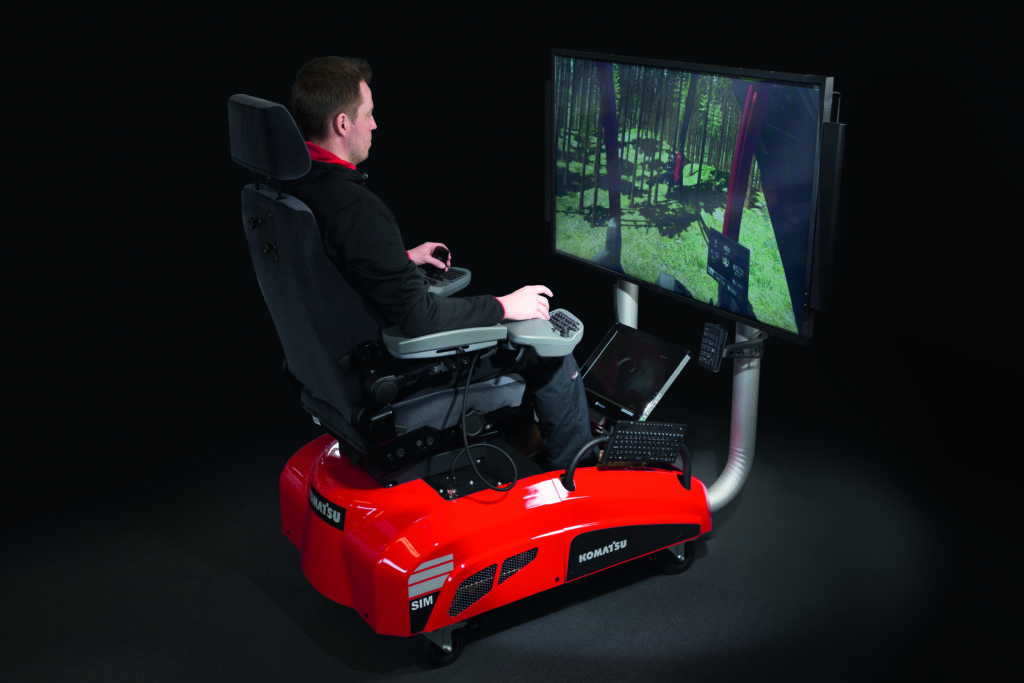



Per Annemalm
Per is currently General Manager of Product Planning at Komatsu Forest Ltd, the distributor of Komatsu Forest machines in the UK. He has a long experience of Marketing & Sales and Product Development as a Product Manager/Area Manager of Komatsu Forest AB in Sweden. He is 49 years of age, and enjoys the British life with his wife and two children in Carlisle.
Speaking to people you soon realise that everyone is blaming everyone else for the lack of skills in our industry. Although some bodies are talking about the skills shortage problem nothing is being done to tackle it, I tuned into CONFOR’s “Skills shortages in forestry and training for the future” webinar on the 7th of October and felt really let down. There was a lot of talking but again no constructive proposals were put forward or ideas on what we can do to fix this. 62 people logged in and as most contractors in forestry, haulage, civil and engineering are suffering from a lack of skilled employees I would have thought that number would have been higher. I admit to getting frustrated with speakers going around the houses and would much rather they got straight to the point as quickly as possible. The open question and answer discussion at the end, usually with limited time, is far more constructive. It might be a better idea to allocate less time to some of the speakers who drone on and on just because they like the sound of their own voice and allow a few minutes introduction.
“It was disappointing to hear recently that Newton Rigg has closed” said Scott Burton of SB Forestry who attended Newton Rigg in the late 90’s. “Regardless of our pathway in to forestry, I feel it’s important to maintain and support the training and educational establishments to keep the flow of knowledge passing down the line. If these facilities fall by the wayside, as a high skilled industry, where will the forestry workers of the future hope to gain knowledge and experience needed to progress, especially considering the ‘red tape’ we already face day to day?
At 16 I began a national diploma in Forestry Engineering at Newton Rigg. With not much experience of purpose built forest machinery the course provided valuable core skills of hydraulics, electrics, welding and basic engineering. These skills are still used every day whether it be diagnosing electrical faults with a customer over the phone or lying under a machine repairing a drive train, the knowledge passed down from all the lecturers and technicians involved in my education is invaluable. The costs involved in running machinery today rules out the ‘learning on the job’ scenario for many people which makes education facilities, such as Newton Rigg, vital.
A major part of the course was to gain workplace experience over the summer between the two years of the course. I was lucky enough to get a place at Partek Forest (Komatsu Forest). This started my career path to becoming a full time service engineer and ultimately to where I am now as the dealer for EcoLog in the UK. Without the kick-start in my career that Newton Rigg provided, who knows if I would have had the skills, the knowledge and the confidence to continue this journey?
In my second year of college, our class were involved in a 3 week European tour, funded by a European grant scheme. The first ten days were spent in Sweden attending a forestry college, a ‘proper’ forestry college! There were factory visits to Rottne and SP but the most interesting part for me was the ‘simulators’. Funded by Timberjack there were 6 cabins mounted to the ground, behind each cab a forwarder crane fixed to a concrete plinth and a steel bunk. An electric motor was set under the cab, which drove the hydraulic pump. This gave operators and engineers a chance to learn how the machine worked and gain experience in loading and unloading timber in a safe environment before being let loose in the forest. It made the mini bruunett 578 sitting back in Penrith feel a little inadequate, even though I was shit hot with the 6 lever controls! (You never lose it!) Given this type of opportunity as a youngster to learn on such machinery, surely must make for far more experienced and qualified operators and engineers? Which leads me to my next point.
Moving forwards I would like to offer help for the future. If there are any forestry related courses looking for a project or site visit, maybe even help with their current machinery, please get in touch, I would be happy to help in any way I could as I value the contribution Newton Rigg made to my education and subsequent career.
I feel, that, as an industry, we should all come together in some form or fashion, be it contractors, machinery dealerships, sawmills and forest marketing companies etc and do our bit, offering our experience, to all the colleges and universities that run courses in forestry. This could be financial support, work placements or mentoring. (I understand there are many companies that are proactive in this respect; however there are also many more companies that are not.) As an industry, we rely on the next generation coming into the profession to keep it going. For this to be successful we need training and education that is fit for purpose and that prepares people to do this highly skilled job. If we as an industry could support this, not only would the next generation of workers have an the opportunity to develop their knowledge and skills in an educational setting we could ensure that we are utilising the many years of experience and skill within our industry to see it go from strength to strength.
Without that investment in our industry, at some point there will be a distinct lack of skilled foresters, operators, engineers and such. Then what?
Scott Burton
Scott Burton is the Managing Director of SB Forestry Ltd, UK agents for EcoLog.
With over 20 years experience in the forest industry as a service engineer and timber contractor, Scott has gained valuable experience in all aspects of timber harvesting. With this experience it enables him to help customers with sales, backup and advice for their forestry equipment. Operator instruction is another aspect of Scott’s business which helps to make customers machinery more efficient and profitable.
Primary Schools
I also believe that we need to change the way in that forestry is perceived by the public, perhaps if we started to invest more time in primary schools where children could be educated so they understand the need for trees to be harvested.
Possibly they could educate their parents on how forestry is a sustainable and well managed industry that works along with nature. Then maybe we wouldn’t get these commercials depicting sustainable logging as the root to all evil and the destruction of the planet!
Jas P Wilson based in Dalbeattie in SW Scotland have a real foothold in all aspects of education and training, this ranges from work carried out with Primary schools, to training on cutting edge equipment for their customers, and everything else in between; and as an accredited LANTRA centre they are able to provide quality, certificated training to meet the needs of their customers and satisfy the requirements of current legislation.
“Everyone recognises the need to introduce the career opportunities available in the industry we are all passionate about”, said Drew Easton, Jas P Wilson’s Learning and Development Manager. “If we cannot encourage young people to consider the Forestry industry as a career choice at all levels, we simply will not have an industry in the future, or it will look vastly different to what we have today.
As part of a recent expansion, Jas P Wilson has invested in bespoke training facilities as part of its office development; this includes two classrooms fitted out with smartboards, an adjacent work area that can be used for training and an outdoor training area for machine operations.
Working closely with educational partners is fundamental to the success of what Jas P Wilson does, a good example of this is the work carried out with Primary 5 pupils from Dalbeattie school, who were studying hydraulics and spent time on site building and experimenting with model hydraulic systems as well as finding out more about how hydraulic systems are used on machines – It was great but noisy fun as the kids enthused about what they discovered, It would be good to think that the “seeds had been planted” and that some of them may become tomorrow’s machine operators, technicians or designers” continues Drew.


Drew has also been involved in the setting up of the Dumfries and Galloway Engineering Forum which addresses recruitment and retention issues by encouraging young people to consider Engineering and Manufacturing as a career option. It was recognised that by working collectively the group would have a much greater resource to support Schools and Colleges, and to develop active partnerships that influence the investment, retention, and development of this key sector in Dumfries and Galloway.
“The partnership working continues with specific projects and work experience for young people when they are at Secondary school, this includes embracing Foundation Apprenticeships that are available in Scotland to study Engineering and Manufacturing.
College and University links play an important role in recruitment for our industry, with work experience as a main driver, often resulting in an offer of employment or preparing a good foundation for progression to higher education. Many of Jas P Wilson’s current apprentices [over 20% of the staff employed] have joined the business through this particular route, and it encompasses Service Engineering Technicians, Machinists, Fabricator Welders and Office Administration – Colleges recognise the value of integrated work experience which provides robust evidence for a qualification, a pilot is currently being timetabled for a complete unit to be delivered by the JPW team at Dalbeattie.
Some of the Service Engineering apprenticeships at Level 2 & Level 3 are delivered and assessed on site at Dalbeattie, with all theory and practical work covered “in house” using a group of dedicated mentors and a qualified and experienced lecturer that works within the business, the advantage is that the young people are learning through undertaking “real practical jobs” under the watchful eye of skilled and experienced technicians, a system of apprentice rotation is used to provide the widest range of experience for the apprentice, who, over a period of time will work on the full range of equipment the company sells and supports.
The state of the art facilities have also been used used to good effect with experienced and qualified staff, with a range of training delivered (in addition to the work undertaken with the apprentices) which can range from Fork Lift Truck training for new staff, Business Systems for key staff, to Hydraulic and Control System updates for technicians – We undoubtedly live in a technological age where keeping up to date with change is a challenge we all have to embrace.
Drew goes on to say that Jas P Wilson became an accredited LANTRA centre in 2018 and currently offers Firewood Processors, Chippers and Winches training as part of their portfolio; “The main motivation for this is to provide a “one stop shop” service for new and existing customers, who potentially require training as part of a purchase of new equipment or changes in staff, quality training provided by Jas P Wilson’s experienced and qualified instructors and assessors that is accredited through LANTRA Awards fully satisfies the “duty of care” requirement the employer has a responsibility to deliver to all their staff, and meets the needs of current legislation.
Through the sale of new machines, Wilson’s always have an excellent supply of quality used machines which have been part-exchanged, often including a wide mix of workshop checked and serviced firewood and forestry machines, each available with warranty. This supply of quality used machines provides users with a high-quality product at a price point more suited to the entry level buyer or a user looking to upscale their production. These machines can be supplied with a training package built into the deal to ensure safe and productive operation from day 1…
Each course is one day duration and delivers hands-on practical skills, health and safety training as well as industry recognised certification to demonstrate that you and your employer have completed sufficient training to meet the industry standard which satisfies Provision and Use of Work Equipment Regulations 1998 (PUWER)”.
In the future it is planned to continue to develop the Education and Training side of the business, “there have been a number of requests for an accredited Log loader course which covers Forestry Trailers and Tractor Mounted Cranes”, says Drew “this is something Jas P Wilson are interested in doing as it fits nicely with the BOTEX machinery manufactured on site, it does require a bespoke course to be developed and accredited, something the company would be willing to undertake if there was sufficient interest.
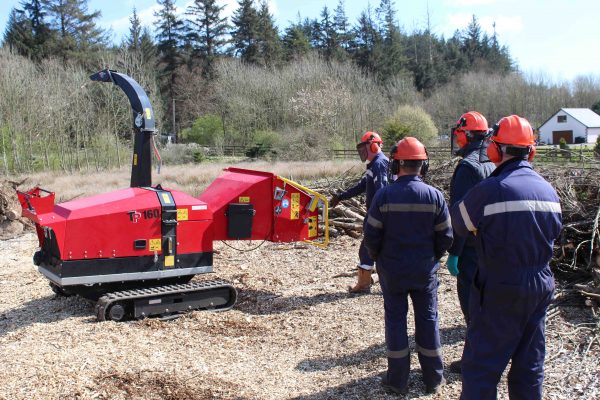

Drew Easton
Drew joined Jas P Wilson in 2016 as the companies Learning and Development Manager. He worked at the Barony College as an Engineering Lecturer before becoming head of Engineering. He has also worked at Dumfries and Galloway College as Head of Faculty for Engineering and Construction. During his time at Barony he taught a considerable number of Jas P Wilson’s technical staff when they did their training
Drew is a lifelong motorcycle enthusiast and enjoys nothing better than a good run out on a bike. He also enjoys motorcycle restoration.
Lantra
Lantra believe a trained and versatile workforce is very important, “Small margins and small organisations mean there is often little surplus to invest in staff development”, says Liz Barron-Majerik, Director of Lantra Scotland. “Many SMEs, especially microenterprises, will resort only to on-the-job training. Offsite training is often too costly, as smaller firms are more dependent on each worker to keep production going and meet demand. Training for them is best provided in off-peak times of the day, week, month, or the year, but external training providers may not be able to accommodate these preferences, especially if the apprentices are few in number.
In addition, micro and small firms are often controlled by a single founder/owner/ manager who manages many aspects of the firm (including HR) and who has less time to dedicate to the recruitment and development of workers. They have very little time to develop links with colleges and training institutions to recruit good new entrants, either as graduates or through internships and apprenticeships.
In order to help address some of the difficulties around recruiting people with the right skills to the Forestry Sector, work has been ongoing to improve the availability of entry level training programmes, including Modern Apprenticeships for drivers and machine operators.
Most of this training was delivered through Forest Enterprise Scotland, as was, and by Scotland’s Rural College (SRUC). However, it was felt that the Forest Machine Operator (FMO) Certificate training, though efficient in terms of ‘time taken’, was constrained due to a lack of consolidation which in some cases meant they did not stay within the forestry sector.
Traditionally, apprenticeships have provided a valuable entry route, particularly for those entering the forest industry at a technical level, hence the work on an Apprenticeship framework suited to this area. One with the ambitious aim of being suited to the FMO role, while also working for, and supporting, the contracting sector too.
One of the unique aspects of a pilot programme for FMOs that took place recently was the collaboration between a government agency, training providers, machinery manufacturers, and private contractors. Candidates were to spend their first year developing their skills with Forestry and Land Scotland (FLS), supported by SRUC Barony, before a year of consolidation with a private contractor or with FLS itself. Each partner supported the pilot in different ways, bringing different expertise and support to the programme.
The apprentices have now completed their underpinning qualification and are working towards consolidating their skills with their employer. One of the contractors said of the initiative: “it was great to ‘get to them before the bad habits have formed from working for another company.””
Jack Marshall, from Newton Stewart, is one of the apprentices working in the south of Scotland. “I actually heard about the apprenticeship in the first place when I was at school, and then went straight into the position when it came up. I’ve always been into forestry machines since I was a young boy, and I just thought it would be the kind of job that would suit me. I always enjoyed being outdoors and its great going into the forest and managing it.”
During his first year, Jack was working with FLS and attending college at SRUC Barony:
“I am now a fully qualified operator so it’s just about improving my skills. I’ve got tickets for the harvester and forwarder, but I prefer the forwarder because I think I’m more suited to it. You’re always doing different things. Sometimes you could be lifting timber, the next day you could be building bridges, making sure everything’s clean on the roadside and making sure it’s presentable.”
You’re learning at the same time as you’re doing the actual job so I feel like you actually learn more because you’re seeing how it’s done day to day. You’re working with other machine operators with lots of experience and they can also give you advice and help to lead you and to improve you.
“We were always well supported in the apprenticeship for help or a general chat about things.”
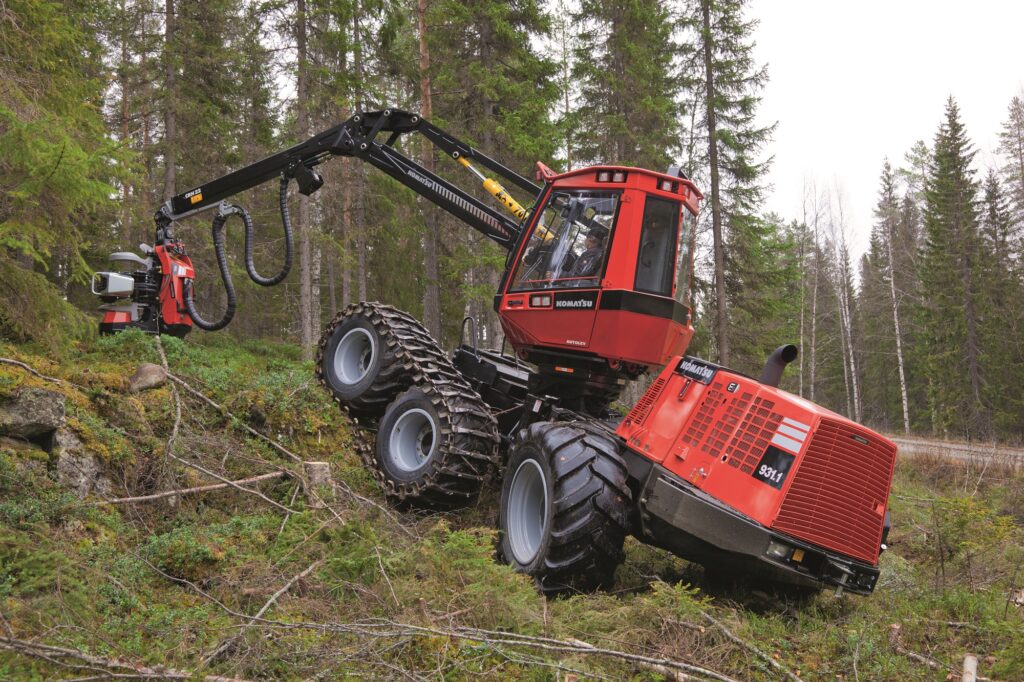

It could even be that if the students have enough simulator time they could be put in as apprentices with contractors. They will not be 100% productive at the start, but they will come pretty far in their skills, especially as working with forest machines is about working with the crane, the grab and the harvester head. The rest of it needs a real machine, and I understand the challenges that you get driving in different terrain, when things can go wrong.
Forwarders and Harvesters were provided to the pilot by John Deere and Komatsu. Komatsu Forest is active in providing tools and services for training in other countries too, so how does this scheme compare to what is happening abroad?
“In Sweden and Finland for example, we offer simulators and have co-operation agreements with schools to provide machines for training” said Per Annemalm, Managing Director of Komatsu Forest Ltd.
“I can’t think of one market where there’s an abundance of scheme operators for forest machinery, I think most markets have the same challenge, that there simply aren’t enough operators who can run these machines with a high productivity, so it is something that is requested worldwide.
It is solved in different ways. In Sweden and Finland it’s usually public run schools and in Brazil and Russia the education activities are run by large forest companies, who keep their own fleet of machines. And in other markets with smaller contractors they usually solve the issue case by case, a little bit like the UK today.”
This pilot was very good for these apprentices. I think they learned a lot. They had a chance to really learn to drive machines or break machines for the larger good of British forestry.”
Although Per thought the scheme was great for the trainees themselves, he believes it’s important to increase the number of apprentices and the amount of time they spend on simulators. Jack agreed that using the simulator at College was really important. “First of all we went onto the simulator at college. We did tasks and everything on it. It was quite useful to get used to the actual buttons on the machine before you went on it so it wasn’t a shock to the system. Being on the proper machine is a bit different when you’re sitting on the seat, there’s terrain and you’re actually lifting timber for real. It gives you a different sense of feeling rather than sitting on the computer, but it does really help for the controls and everything.”
The best bit about my job is that not every day is the same. Weather is a big thing as well. One day you could go to your job in sunshine, lifting timber, and some days it could be lashing and you have to spend more time doing brashing to maintain your tracks and your haulage routes. Every day’s different!”.
Liz Barron-Majerik said: “This was a new initiative that hadn’t been tried before in Scotland. From the outset, a collaborative approach between a significant number of stakeholders was required and was actively promoted and supported by those leading the development. Although there were some challenges at the start, everyone has really pulled together to ensure a great experience for the apprentices.”
So would Jack recommend his path to others? “I certainly would recommend it as a career. I think it’s great if you’re into machines and enjoy the outdoors as it’s a perfect opportunity.”
Lantra’s work in Scotland is supported by the Scottish Government.
All involved agreed on the need for more recruits and a rapid roll out of apprentices beyond this pilot area. A typical view was “The support must be across industry, from manufacturers of these machines in terms of supplying the machinery and buy-in from the wider industry. The shared apprenticeship model is good, but unless more major contractors or bigger players become engaged, we are not going to get young people joining the industry.
Liz Barron-Majerik


Liz Barron-Majerik
Liz is the Director of Lantra in Scotland, a charity which exists to help ensure Scotland’s land-based and aquaculture sectors can meet their skills needs. Lantra is also heavily involved in the promotion of these sectors as positive and rewarding career options.
Prior to taking on this role Liz was Head of Natural and Applied Science for Inverness College UHI, a role which included management of the Scottish School of Forestry, as well as the science and aquaculture provision.
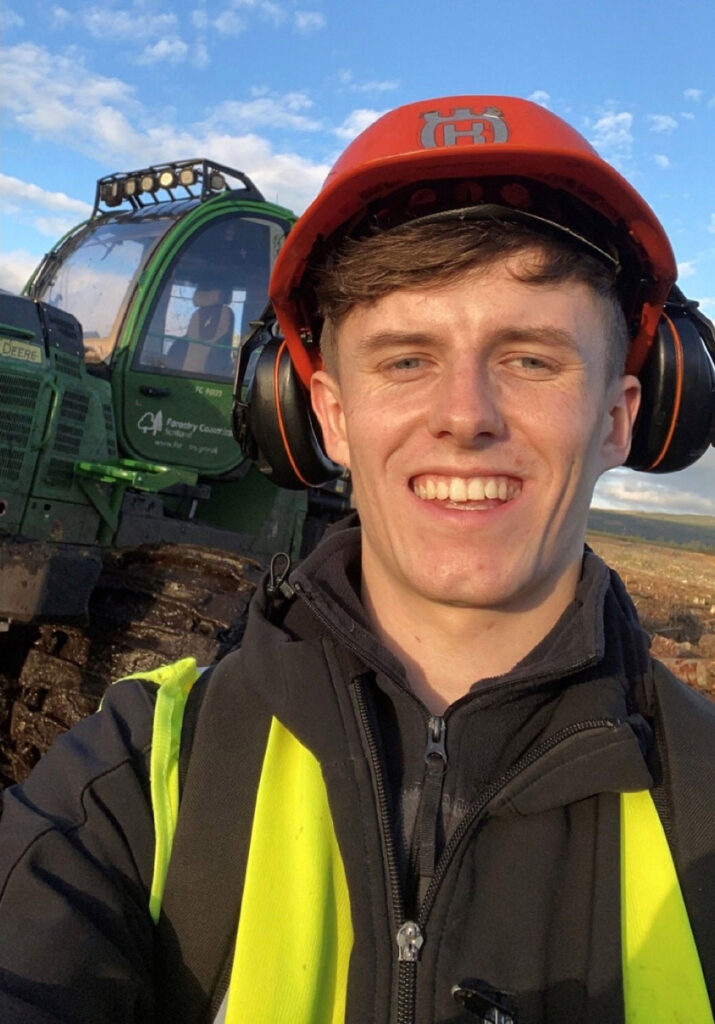

Jack Marshall
I’ve always been into forestry machines since I was a young boy, and I just thought it would be the kind of job that would suit me. I always enjoyed being outdoors and its great going into the forest and managing it.
A Wider View
I thought I would try a different approach to the problems that we are facing by asking a broad spectrum of people from throughout the industry for their suggestions on how they are addressing this and what ideas they had for going forward. I had no idea that so many would take the time out of their busy schedules to get information over to me, it goes to show that many of us feel exactly the same. I applaud those who have taken it upon themselves to implement training schemes at their own considerable expense. This can be very costly as once you have spent time and money training new operators to a good level of competence they are free to leave your employment and seek work elsewhere. One such forestry contractor who should be commended for this is Jim Wilmer, of Jim Wilmer and Sons Timber Harvesting Ltd. Jim is currently in the process of training six apprentices which is both time consuming and costly to the company.
The trainees are being tutored by skilled professional operators who are happy to pass on their experience to the eager young operators.
I have the utmost respect for Jim and his team for his commitment in investing in young people and giving them the opportunity to get a start in the industry. Desperate times calls for desperate measures and there should be financial assistance from Government to allow schemes like this to continue. Jim Wilmer and Sons Timber Harvesting Ltd will have trained more forest machine operators this year at his own expense than all the Government funded forestry schools and colleges, let that sink in!
Perhaps it’s time for our representatives, who we fund with our hard earned cash, to stand up and be counted; the future of our industry depends on your actions.
H&W Forestry Services
Many independent companies offer training. H&W Forestry Services, based in Dumfries (South West Scotland), and with training sites in Cumbria and Newcastle (North England), are fully qualified NPTC assessors and LANTRA training providers covering the whole of the UK and Ireland. Founded in 2008, Stephen Hailes established H&W Forestry Services following his background in arboriculture and as a forestry instructor at the SRUC Barony College.
Providing forestry and land based training courses for individuals, or groups, who need to expand their skills in certain areas for the Vehicles and Off Road driving, Health and Safety, First Aid, Ground Care and Pesticides. H&W Forestry Services are ISO 9001:2015 (Quality Management) and ISO 14001:2015 (Environmental Management) accredited.
Forsyth Forestry Training
Forsyth Forestry Training, established in January 2017 is based in South West Scotland, serving the whole of the UK. We specialise in training, assessing and consultancy for the forest industry but also offer these services to other industries such as agriculture.
The company is owned and run by Bob Forsyth who has 20 years’ experience in the Forestry Industry, mainly in the operation of various forest machines with the last 10 years in Training. Bob is also an assessor and Technical Verifier for all FMO City & Guilds units as well as some of the other land-based units. Along with this experience in different areas of forestry Bob holds his level 3 Award in Education and Training which means we can understand all your training or consultancy needs and come up with the correct solution to ensure you or your company stay within the Law and to work more safely and more efficiently.
Bob’s route into forestry was from the mechanical engineering side but very quickly he realised that being in the cab operating the machine was a much nicer place to be than lying underneath it in the mud and water. Bob attended the first machine operator training course at the Barony in 2000 in order to get his FMO forwarder tickets, back in the days when you had to sit 4 or 5 assessments just to cover all forwarder types. He was then offered a chance to go to Wales to work for what was then the WHAM department of Forestry Commission Wales. This was a great opportunity to operate different machinery. He learned a lot about steep ground whilst there and also that there was somewhere where it rained more than in South West Scotland! It was whilst in Wales that he received harvester training from the FC machinery trainer; this obviously made an impression and started him thinking of training as a possible future occupation.
Bob also holds his NEBOSH general certificate, enabling FFT to offer practical health and safety advice to ensure understanding and compliance of legislation. This knowledge has also been gained from working closely with the HSE in the past to help organise and deliver training for their own inspectors and also to run Safety Health Awareness Days on behalf of the HSE, delivered out to the whole forest industry.
We will come to your place of work wherever you are based to ensure your training is relevant to the equipment you are using and the work you are carrying out. Our aim isn’t to just train someone to pass an assessment but to teach the skills which will ensure you can work more safely, more efficiently and become a valuable employee or to run a successful business. We will help you become an operator and not just a driver.
Bob Forsyth
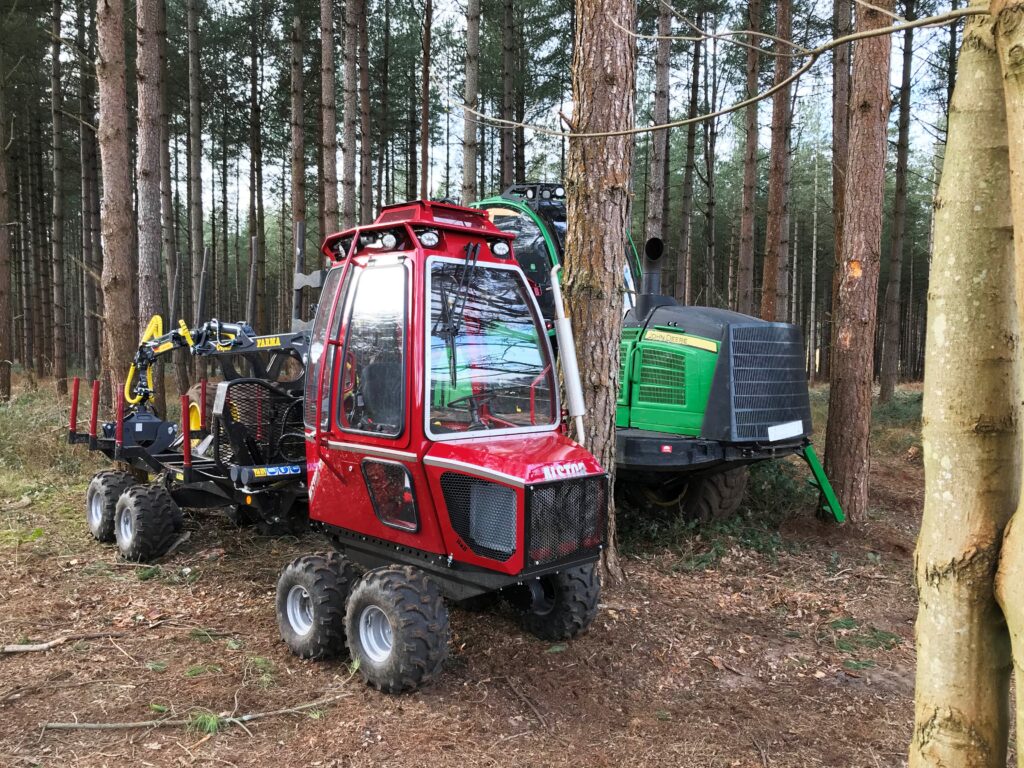

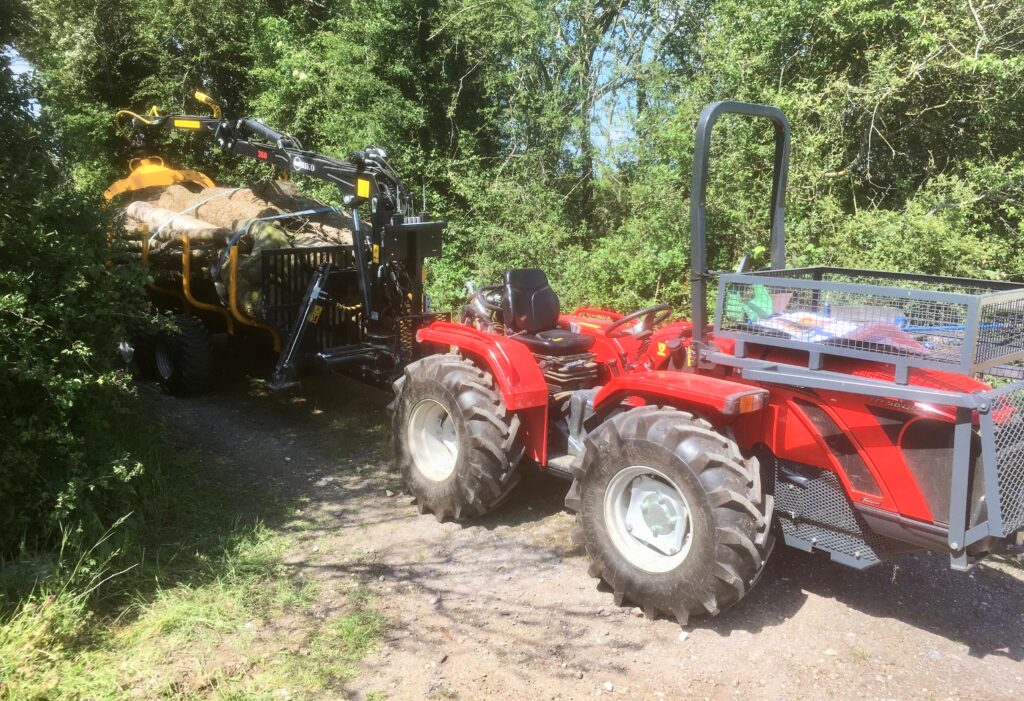

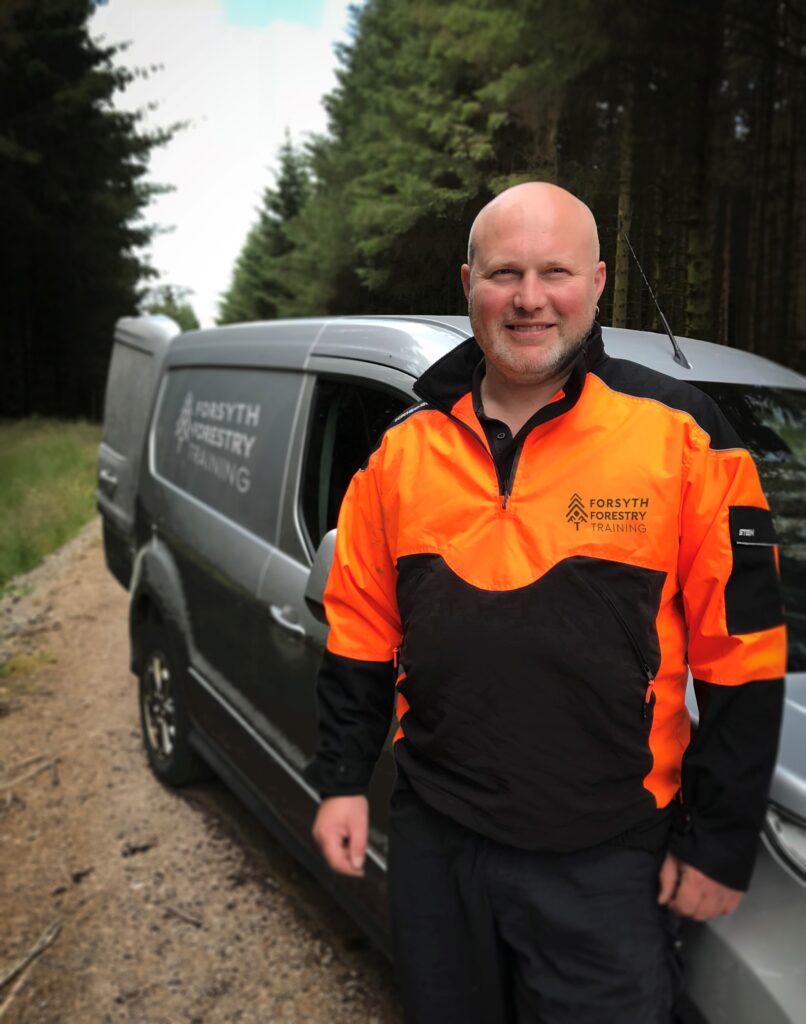

Bob Forsyth
Forsyth Forestry Training is owned and run by Bob Forsyth who has 20 years experience working in the Forestry Industry. Formerly a Technical Trainer for the Forestry Commission, Bob has the expertise and technical knowledge to deliver the right training to meet your needs.
Forsyth Training
Harvester / Forwarder Operator
Forestry Tractor Operator
Skidder Operator
Agricultural Tractor Operator
Excavator Operator
Mounding and Drainage
Cable Crane operator
Ploughing
Scarifying
Sit in ATV / Sit Astride ATV (quads)
Flails and mulchers
Chippers
Abrasive Wheels
Clearing saw, Brushcutter and Strimmer
Working at Heights on Machines
Recovery and De-bogging
Safe use of hand winches for ATV recovery or carcass extraction
Mechanised harvesting operations, supervisor event
Establishment and ground prep, supervisors’ event
General Forestry Supervision
Cable crane supervisor’s event
Risk Assessment
Manual Handling,
Electricity at work
Managing Health and Safety in Forestry.
Pollution Control
Forest and Water
Plant care and Planting
AW Jenkinson
“The skills shortage in the industry is something we take very seriously” said Sara Valentin of A W Jenkinson “and we have a range of in-house training schemes to ensure continuous staff development and a consistent standard throughout the company. Among the training courses we offer our staff in conjunction with NuCo is Level 3 Award in Emergency First Aid at Work and Level 3 Award in Forestry First Aid (+F) – each course is externally accredited by the First Aid Awards (FAA).
Another area of training is apprenticeships – we offer schemes in LGV Driving, LGV Service and Maintenance, Fabrication and Welding, Supply Chain Operator, Professional Accounting and Taxation, Engineering Maintenance, Game and Wildlife Management, Business and Administration”.
James Jones & Sons
The timber industry is one of Scotland’s most important sectors and to keep that one billion pound industry going strong takes much more than just felling trees. Timber and forestry offers young people a varied and diverse career path and includes everything from harvesting and haulage through sales, sawmill management, environmental protection, logistics, customer services and product development to name a few.
James Jones & Sons is one of the UK’s largest and most progressive timber companies with core activities in sawmilling, I-Joist and pallet manufacture. We operate five sawmills throughout Scotland; an engineered wood manufacturing plant in the north of Scotland and have pallet and packaging operations at fifteen sites across the UK. We produce high quality, British grown sawn timber for the construction, pallet, packaging, fencing and agricultural sectors and pallets and packaging for blue chip domestic and exporting businesses. In addition, we are the market leaders in the supply of JJI-Joists to many of the UK’s top house builders.
At James Jones & Sons we offer exciting opportunities for school leavers and graduates to develop and grow their career within our company. We offer a very positive company culture, which provides full support for ambitious individuals to grow and develop; investing in people to become future leaders.
Euan is a harvesting manager at James Jones and has been with the company for over 5 years. “It is a very diverse place to work. I came to James Jones after my first year study. After my mid year placement I was offered a placement continuing with my studies part time with distance learning. I was able to facilitate studying as well as working and developing my role. I have just finished my forestry degree”.
Egger
Seven new apprentices marked the beginning of their career at EGGER on Thursday 17th September by planting a tree in Barony’s Apprentice Forest. This year, Ben Menzies and Blair Nicholl join as Electrical apprentices, Jamie Kennedy and Darren McGuckin join as Mechanical apprentices, Lewis Symonds and Sam McKee join as Manufacturing apprentices and Robbie Brown joins as a Stores apprentice.
Barony’s Apprentice Forest was established in 2019, with this year’s additions taking the total number of trees to 13. The planting of the trees represent the new apprentices putting down their roots at EGGER, and marking the start of a successful career. The apprenticeship programme offers young adults the opportunity to begin their career in the STEM (science, technology, engineering, and maths) industry. Apprenticeships at EGGER lead to a Level 3 Scottish Vocational Qualification, with the potential to go on and achieve a degree.
In 2019/20 EGGER Barony won three awards for its successful apprenticeship programme. It received an Ayrshire Business Award for developing Ayrshire’s Young Workforce, a S1jobs award for Best Employer Training and Development, and the Skills Development Scotland Scottish Apprenticeship Award for SME Apprentice Employer of the Year. Heiko Lichtblau, Plant Director at EGGER Barony, said, “We are delighted to welcome our new apprentices to the team. Over 20% of our current workforce joined EGGER Barony as an apprentice, which illustrates our ongoing commitment towards the development of our employees”. Heiko continues, “Our Apprentice Forest recognises the first step of our apprentices career, and like the trees, we can watch them grow alongside our business”.
Scottish School Of Forestry
“What does a career in forestry look like? And what does a forester do? These are common questions I am asked when we attend careers events or hold open events at the Scottish School of Forestry” says Neil Cleland, Depute Head. “So, how do we respond. Well, we tell prospective students the truth – forestry is an expanding, modern, future-thinking sector guided by science, technology, research, and innovation. It is an industry which offers a diverse range of high-quality, rewarding careers with excellent progression routes, with opportunities to work indoors and outdoors, in urban and rural settings, where no two days are the same. It’s also an industry for people who want to make a difference – people who care about climate change, the environment and the role trees play in locking up carbon, and who are passionate about sustainability and the value our forests have to our economy through planting, harvesting and construction, our natural environment and our communities.
With ambitious targets set for tree planting, net-zero greenhouse gas emissions and economic growth through timber production, recreation and tourism, coupled with an ageing workforce, employability is high with a diverse range of skills and expertise needed now and in the future.
This includes tree breeders and growers to work in the nurseries; forest managers who understand soils and what tree to plant in any given location; harvesting managers who can accurately measure the timber that can come out of a forest, communicate with contractors and operators and manage that process; ecologists to make sure we discharge our responsibilities for looking after the environment; and recreation rangers who can help people get the most enjoyment out of their visit to our forests.
At the Scottish School of Forestry, part of Inverness College UHI, University of the Highlands and Islands, we are in a unique position to respond to both the challenges and the opportunities within the sector. We are currently the only provider of undergraduate Higher Education in Forest Management and the only provider of both Further and Higher Education forestry and arboriculture programmes in the UK, all delivered within our own practical training environment on the outskirts of Inverness. We also have a growing research, knowledge exchange and innovation capacity in areas of timber technology, data science, forest biodiversity, land management, forests and people. This means we have flexible courses to suit all levels of ability, including full-time, part-time, distance learning and apprenticeships, and welcome you whether you are a senior phase secondary school pupil attending once a week as part of our schools programme, a recent school leaver, a graduate, a career changer or someone already employed in the sector looking for flexible, distance learning options.
Our programmes are designed like building blocks, where you get credit for prior learning and experience, can enter at a level that suits you, progress seamlessly from one level to the next (with the level of difficulty, skills and knowledge increasing as the SCQF levels rise) and exit with a qualification when the time is right for you.
The Scottish School of Forestry has over 45 years of delivering training to the next generation of forestry workers and we value our industry partners and membership of the Forestry Advisory Council, which helps us keep our curriculum current and fit for purpose, providing our students with industry insight through guest lectures, industry awards, site visits, work placements, trips and events. We also work with the industry to ensure our courses remain relevant and the learning mirrors what’s actually happening in the workplace. Our students are exposed to the latest industry specific computer simulation technology to operate harvesters, how timber lorry operators are now using virtual reality headsets to load timber and drones are helping foresters collect and collate data quickly.
However, we need to ensure our students keep apace with the drive to match the sustainable approach to managing our forests with innovations in engineering and modern, more efficient and environmentally friendly machinery, as well as changes to health and safety requirements. This collaborative relationship is critical to the success of our students, and the success of the industry if we are to ensure a talent pipeline for a sector, which will continue to be changed by innovation, technology, research and science. We have always valued the practical approach to the learning process and only with a strong relationship with industry – at all levels – can we rise to the opportunities and realise the full ambitions of the sector.
Our doors are always open to industry and we welcome approaches from anyone interested in shaping the future of our teaching to ensure our students graduate with the skills they need. Whether you’re interested in guest lecturing or giving our students insight into what’s happening in your business, you have work experience opportunities you would like to promote, or you have a project or challenge, which you think we may be interested in, either as a learning project or a dissertation subject, please get in touch. We also remain committed to collaborating with industry to change perceptions about forestry and promote careers in the sector. We have already started those discussions with organisations like RSFS, ICF and Confor, but we welcome further dialogue on how we can all work together to do this.
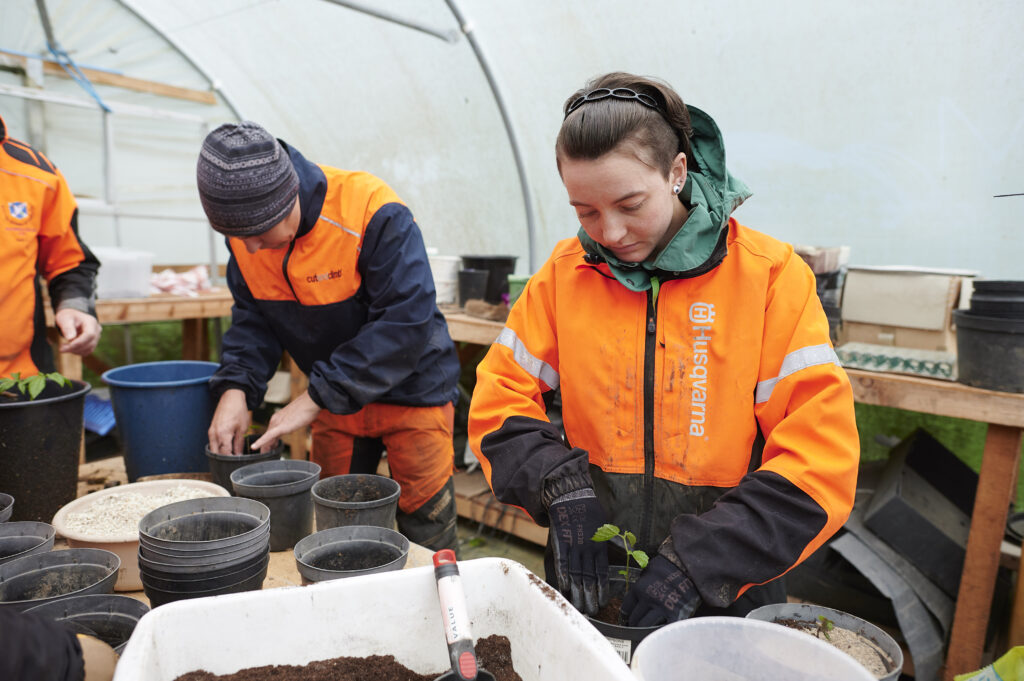

NC Rural Skills (SCQF Level 4) – full time and part time, introducing students to forest craft/conservation skills and providing insight into careers in the industry.
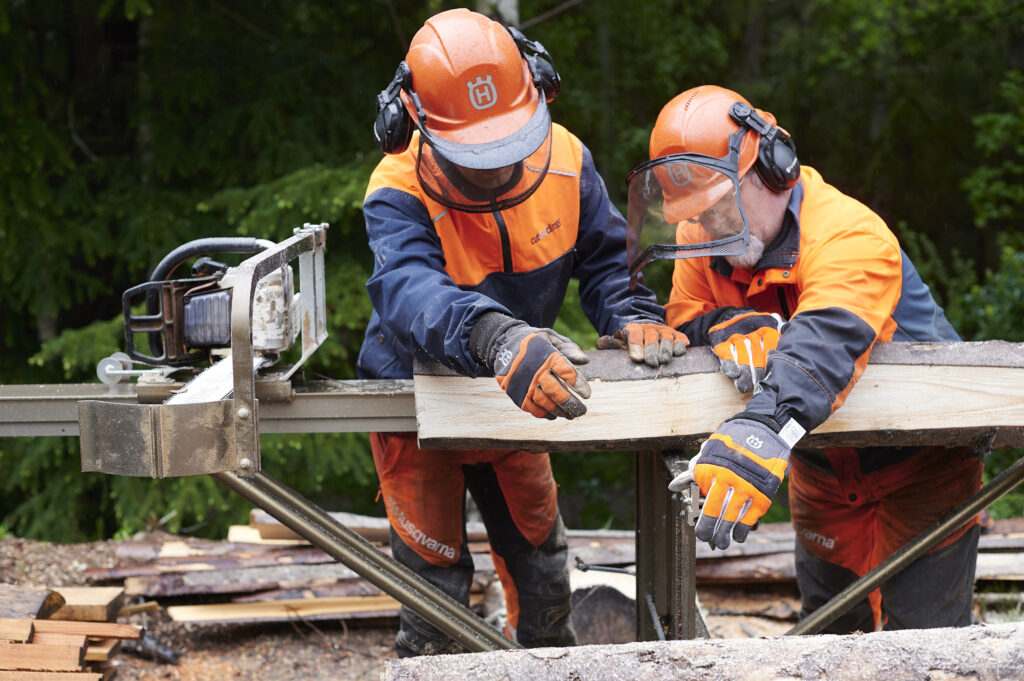

We also deliver a number of short courses including chainsaw maintenance, cross cutting and tree felling; cross-cutting; ATV; chipper use and health and safety.
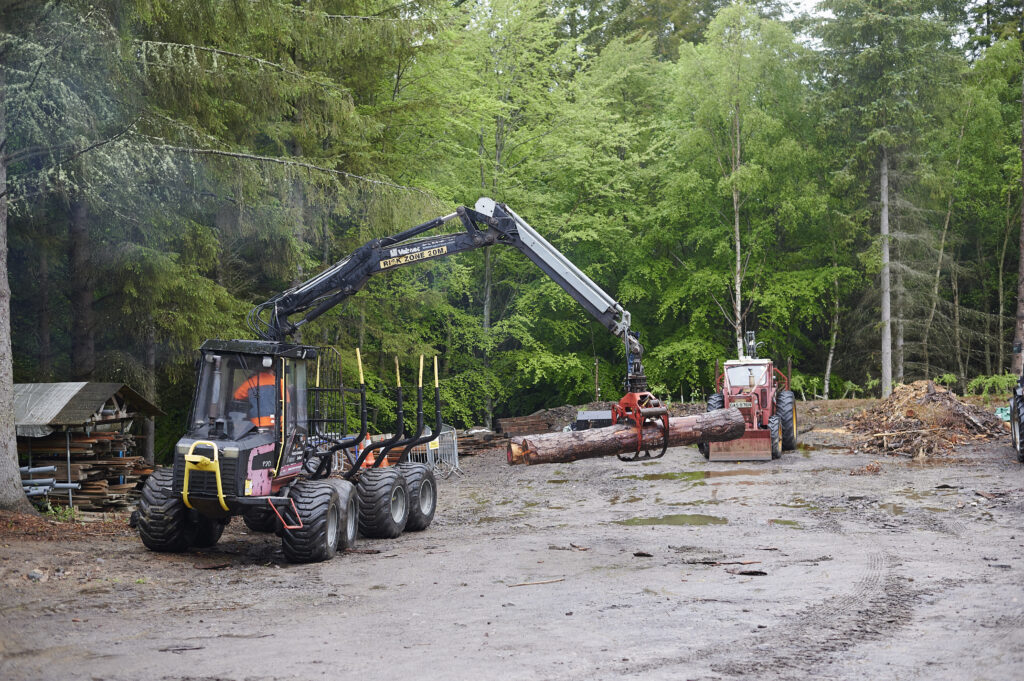

In line with Scottish Government advice, we continue to follow a blended approach to learning this year, including a combination of video conferencing, online materials, timetabled interactive sessions delivered remotely, real time support from staff, as well as face to face teaching, where this is important. Following our initial phased return to campus in September, and by splitting classes and groups of students on campus at any one time, we now have all students attending for some face to face delivery this semester. The University of the Highlands and Islands partnership has over 20 years’ experience in blended learning and we continue to build on that expertise to enhance delivery of our courses.
Neil Cleland


Neil Cleland
Neil has over 40 years’ experience in the forestry industry, working in a variety of forestry roles from estate worker through to forestry contractor. He was also involved in the establishment of Cantraybridge College, Scotland’s specialist further education rural skills college for young adults with learning disabilities.
He has worked at the Scottish School of Forestry since 1990, joining the team as a full-time lecturer in 2010, lecturing across our range of further education and higher education programmes. A former student of the Scottish School of Forestry, Neil now works in the head role, leading on its future work.
Neil is also a qualified British Sign Language interpreter.
Scottish School of Forestry Courses
- Certificate in Forestry (SCQF Level 5) – full time, providing students with the knowledge and practical skills for forest crafts/conservation, providing greater insight into forests and their management.
- Advanced Certificate in Forestry (SCQF 6) – full time, developing a student’s practical skills, knowledge and understanding of the social and productive values of woodland.
- Modern Apprenticeship in Trees and Timber (SCQF Level 5/6) – available to people employed in an arboriculture or forestry environment. Designed to prepare students with practical skills and knowledge from a craft persons level up to a supervisory role.
- HNC Forestry – full time, part time and distance learning options. This course provides students the skills, knowledge and experience required to pursue work as a supervisor or self-employed contractor in the industry.
- HNC Arboriculture and Urban Forestry – full time and part time options. This course develops a student’s skills, knowledge and experience to manage trees and woodlands in an urban setting.
- HND Forestry – full time, part time and distance learning options. This course will develop your skills, knowledge and experience beyond HNC level. Our HND Forestry includes a mandatory year in industry (optional for those with industry experience already)
- HND Arboriculture and Urban Forestry – full time, part time, including optional year in industry extending course from two-years to three-years. This course will develop your skills, knowledge and experience beyond HNC level.
- Professional Development Award in Forestry (SCQF Level 7/8) – distance learning programme for people already working in industry, designed to develop knowledge, understanding and skills to pursue supervisory or management roles.
- BSc (Hons) Forest Management (SCQF Level 9/10), accredited by Institute of Chartered Foresters – full-time and part-time, with option to study with arboriculture and urban forestry. Distance learning option for those working in industry. This course develops a student’s skills, knowledge and experience beyond HND level and provides a technical management qualification to pursue a successful forest or arboriculture managerial role.
SRUC (Scotland’s Rural College)
SRUC is a widely respected higher education and further education institute dedicated to producing specialist research, delivering high quality education and providing comprehensive consultancy services in the rural sector within the UK and beyond. An organisation unique in Scotland and one of the largest organisations of its kind in Europe; we aim to lead the way in innovation and sustainable development in the agriculture and rural sectors at local, national and international levels.
SRUC runs a number of forestry and arboriculture courses from its barony campus based near Dumfries.
Certificate in Forestry
The course provides an introduction to a broad range of forestry and arboriculture topics, and is a balanced programme with a strong practical content. Some of the topics include chainsaw work and tree felling, tree planting, fencing and estate work, as well as tractor and chipper operations. You will be introduced to technical subjects such as forest soils, tree identification, pests and diseases and timber produce. Some of the course will also include IT. You will gain experience working on college grounds and on public and private forest estates. We have very strong links with industry and this has enabled students to obtain work experience and in some cases employment. Some example modules are: Chainsaw Operations; Tree Identification; Introduction to Forests and Woodlands; Tree Production; Introduction to Forest Harvesting.
Advanced Certificate in Forestry & Arboriculture
This course offers the opportunity to specialise using 3 pathways: General Forestry, Forest Machinery or Arboriculture. Some of the topics are tree and forest ecology, planting and care of trees, practical tree climbing, tree survey and inspection, forest and tree measurement, silviculture, forest machine service and repair and specialist forestry machinery operations and use of geographical information systems. Some of the course will also include IT. You will gain experience working on real practical jobs, operating machines, and tree surgery contracts, both on campus and on private forest estates. Some example modules are: Forest Ecology; Pests and Diseases of Trees; Pesticide Application; Forest Harvesting Machinery; Tree Climbing and Rescue Techniques.
HNC Forestry (Forestry or Urban Forestry)
Throughout this course, you will develop skills and knowledge in forestry or urban forestry. This course offers the opportunity to specialise in Forestry or Urban Forestry. Some of the topics are Forest Sciences, Forest Operations, Woodland Conservation, Silvicultural systems, Forest and Tree Ecology. You will gain experience working on Mensuration and Geographical Information systems, while developing an awareness of health and safety and environmental issues relevant to modern forestry. *to be validated Example modules: Arboricultural Operations; Nursery Production; Forest Science; Management of Machinery; Amenity Tree Management.
WORK-BASED LEARNING Opportunities at the Barony
Scottish Vocational Qualifications and Modern Apprenticeships provide those who are in employment the opportunity to gain qualifications whilst at work. The amount you need to attend college can vary depending on the qualification. SRUC offers the following opportunities in the subject area of Forestry and Arboriculture:
- SVQ Trees and Timber at SCQF Level 5
- SVQ General Woodlands and Tree Work at SCQF Level 6
- SVQ Arboriculture at SCQF Level 6.
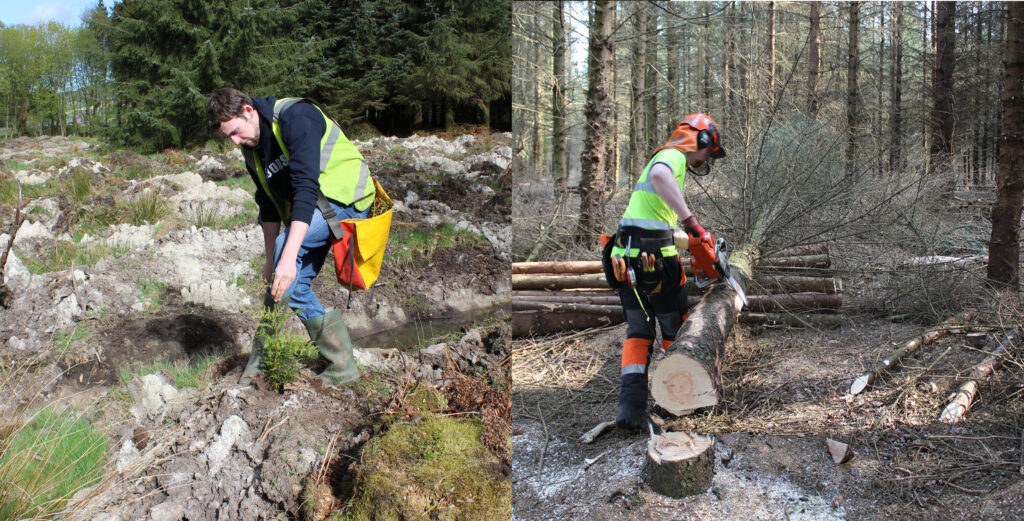

Machine manufacturers are eager to help colleges by supplying equipment at discounted prices. Skilled operators often get to choose the brand of equipment they operate so getting students to become loyal to a specific manufacturer during training can increase future sales for that company.
Machine operator education, the Nordic way
“It can be worth looking at the educational system in other markets as we struggle with the challenge of solving the supply of skilled labour for the British logging industry.” says Per Annemalm. “Over the years Sweden and Finland have been able to supply the forest industry with graduated students that have gained the necessary experience as machine operators. Sweden has no College education system, the children graduate from elementary school at the age of 15-16 years of age. The majority go on to schools for 3 years of A-levels education which qualifies for higher education for those who choose to continue.
There are quite a few dedicated publicly run forestry/farming schools for students who want to learn how to operate forest machines. The courses are for 3 years, give A-levels exams and are funded by the Swedish local governments (Councils). Swedish councils have the responsibility for the education system below university level and finance this through higher share of the public taxes going to the councils. The education is free of charge for the students, and the forestry schools receive higher public grants than schools with theoretical education, to cover their higher costs for the education. The students also have theoretical subjects on their curriculum, like Math, Swedish, English, Social and Nature Science, to enable them to acquire skills for several types of career.
The forestry schools have different strategies for handling the high costs of forest machine resources for their students. The majority of schools have their own forest machine simulators. This keeps the cost per training hour lower. It is efficient in the initial stage when the students need to learn the functions and the basic methods for harvesting and forwarding. It is also useful and cost efficient for acquiring the necessary skills for handling the crane and crane tip equipment efficiently.
The teachers have operator experience and instruct the students step-by-step. All students will have the opportunity to work with real machines. Some schools finance the purchase of new, second hand or leased machines with extra public grants. Other schools cooperate with forest machine suppliers to have short term leasing contracts for machines, running a shorter but more intense period of the school year, with real machines. It is also very common that the schools use older machines. They don’t need the highest productivity or uptime out of the machines, and they have workshops, tools and know-how to repair them. In contrary to many other European countries, Sweden has a large percentage of forests owned by large corporations, such as SCA, Stora Enso, or Holmen. The corporations have a good cooperation with forestry schools, reserving logging sites which they can use for their machine practicing, making it much easier for the schools to plan a sustainable education. This, together with the long-term commitment from the councils for their funding, and the simulator equipment, is perhaps their most important key for their success.
Conclusion
Forestry is a growing industry in more ways than one and as the population increases so does the demand for timber products. The UK Government is boosting tree planting which is great news for the future of forestry. It is important that people at the highest levels are supporting this, but what is the point if there is no one to harvest or haul the timber in the future.
SRUC offer a five day (9am-4.30pm) one on one forest machine operator training course on a forwarder with an assessment for your NPTC certificate on the 6th day. You may be eligible for a £200.00 funding grant to help towards your course fees of £2660.00. I don’t know of many teenagers looking for work or wanting to work in forestry who have £3K burning a hole in their pocket! There appears to be a lot of funding available for most areas of forestry apart from recruitment and training for the people who actually carry out the work.
Everyone is doing the best they can with the small budgets that they have but with increasing staff shortages it is falling well short of what the industry needs. Lantra released a great short video on Friday 6th of November which I shared on social media. This is a step in the right direction for getting our industry into the spotlight. Using a celebrity to highlight forestry in a fun way and putting a positive spin on the industry. If you get the chance please share the video.
As an industry we have to change and make it a more appealing occupation for young people to choose and worthy of investment for contractors. Contractors invest heavily in new equipment and are at the mercy of management companies and landowners for the contract rates. When timber prices were at a premium contractors still struggled on low rates. How can we expect contractors to invest in training when their running costs are continually rising and profits reducing? We work in a sustainable industry, and unless changes are made, with an unsustainable workforce.
Rab Easton
Contacts
Treeline Woodlands Ltd – 01968 660 698
E. info@treelinescotland.com
www.treelinescotland.com
Komatsu Forest Ltd – 01228 792 018
E. info.uk@komatsuforest.com
www.komatsuforest.co.uk
SB Forestry Ltd – 07795 438 341
E. sales@sbforestryltd.co.uk
www.sbforestryltd.co.uk
Jas P Wilson – 01556 612 233
drew@jaspwilson.co.uk
www.jaspwilson.co.uk
Lantra Scotland – 01738 310 164
E. scotland@lantra.co.uk
www.scotland.lantra.co.uk
Jim Wilmer & Sons – 01465 811 600
E. info@jimwilmer.co.uk
wwwjimwilmer.co.uk
H & W Forestry Services – 01387 710 557
E. info@hwtraining.co.uk
www.hwtraining.co.uk
Forsyth Forestry Training – 07342 652 585
E. bob@forsythforestrytraining.co.uk
www.forsythforestrytraining.co.uk
A.W. Jenkinson – 01931 712 644
E. sara.valentin@awjenkinson.co.uk
www.awjenkinson.co.uk
James Jones & Sons – 01324 562 241
E. info@jamesjones.co.uk
www.jamesjones.co.uk
Egger (UK) Limited – 01434 613 395
E. Kate.Wallace@egger.com
www.egger.com
Newton Rigg – 01768 893 400
E. enquiries@newtonrigg.ac.uk
www.newtonrigg.ac.uk
Scottish School Of Forestry – 01463 273 601
E. neil.cleland.ic@uhi.ac.uk
www.inverness.uhi.ac.uk
SRUC (Scotland’s Rural College) – 01387 860 251
E. barony@sruc.ac.uk
ww1.sruc.ac.uk
Forest Machine Magazine – 07582 055 748
E. forestmachinemagazine@mail.com
www.forestmachinemagazine.com
Thank you to everyone who took the time to contribute to this article.
I would love to hear from you if you have any ideas or views on this subject.
Forest Machine Magazine is written and edited by a forest professional with over 40 years hands on experience. We are dedicated to keeping you informed with all the latest news, views and reviews from our industry.
To support us you can subscribe to our bi-monthly magazine which is delivered to your door from only £30 per year.
Subscribe here
#homeoflogging #writtenbyloggersforloggers #loggingallovertheworld
-

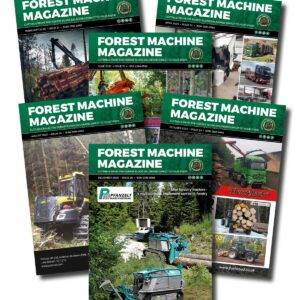 1 Year Subscription£0.00
1 Year Subscription£0.00 -

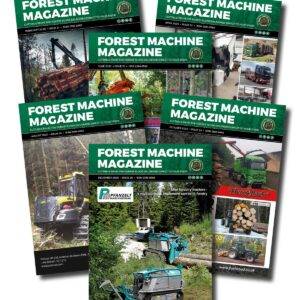 2 Year Subscription£0.00
2 Year Subscription£0.00 -

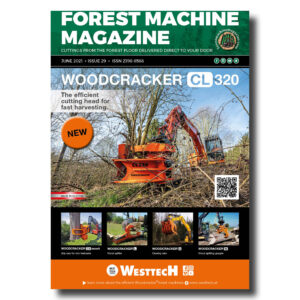 Issue 29£6.00
Issue 29£6.00 -

 Issue 31£6.00
Issue 31£6.00 -

 Embroidered Beechfield Beanie£9.95
Embroidered Beechfield Beanie£9.95
